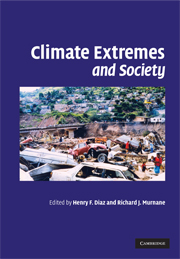Book contents
- Frontmatter
- Contents
- List of contributors
- Foreword
- Preface
- The significance of weather and climate extremes to society: an introduction
- I Defining and modeling the nature of weather and climate extremes
- II Impacts of weather and climate extremes
- 8 Extreme climatic events and their impacts: examples from the Swiss Alps
- 9 The impact of weather and climate extremes on coral growth
- 10 Forecasting US insured hurricane losses
- 11 Integrating hurricane loss models with climate models
- 12 An exploration of trends in normalized weather-related catastrophe losses
- 13 An overview of the impact of climate change on the insurance industry
- 14 Toward a comprehensive loss inventory of weather and climate hazards
- 15 The catastrophe modeling response to Hurricane Katrina
- 16 The Risk Prediction Initiative: a successful science–business partnership for analyzing natural hazard risk
- Index
- Plate section
- References
11 - Integrating hurricane loss models with climate models
Published online by Cambridge University Press: 14 September 2009
- Frontmatter
- Contents
- List of contributors
- Foreword
- Preface
- The significance of weather and climate extremes to society: an introduction
- I Defining and modeling the nature of weather and climate extremes
- II Impacts of weather and climate extremes
- 8 Extreme climatic events and their impacts: examples from the Swiss Alps
- 9 The impact of weather and climate extremes on coral growth
- 10 Forecasting US insured hurricane losses
- 11 Integrating hurricane loss models with climate models
- 12 An exploration of trends in normalized weather-related catastrophe losses
- 13 An overview of the impact of climate change on the insurance industry
- 14 Toward a comprehensive loss inventory of weather and climate hazards
- 15 The catastrophe modeling response to Hurricane Katrina
- 16 The Risk Prediction Initiative: a successful science–business partnership for analyzing natural hazard risk
- Index
- Plate section
- References
Summary
Condensed summary
Hurricane loss modeling has become an important if not vital aspect of many elements of hurricane planning, especially in the financial sector. The insurance industry has provided financial motivation for the development of complex hurricane damage and loss models. These models rely on a number of databases and model subcomponents that interact in complex ways, the most critical of which is hurricane climatology. The required hurricane climatology is developed through various analyses of the historical record. Unfortunately, there are numerous issues with the historical record that make detailed analysis of that record problematic, such as the length of the record, the quality of the observations, and the potential that the record is complicated by natural or anthropogenic climate signals. As climate modeling continues to advance, there is increasing potential for the use of these models to drive loss models, overcoming many of the limitations of the existing historical record. Here we describe the results of a study conducted for the Florida Commission on Hurricane Loss Projection Methodology (FCHLPM), a part of which was an assessment of historical hurricane climatology, and the potential for the use of general circulation climate models in driving loss models for both existing and future climates. The Community Climate System Model (CCSM) was used to drive a mesoscale model, which in turn was used to create inputs to an ensemble of loss models.
- Type
- Chapter
- Information
- Climate Extremes and Society , pp. 209 - 224Publisher: Cambridge University PressPrint publication year: 2008
References
- 4
- Cited by

